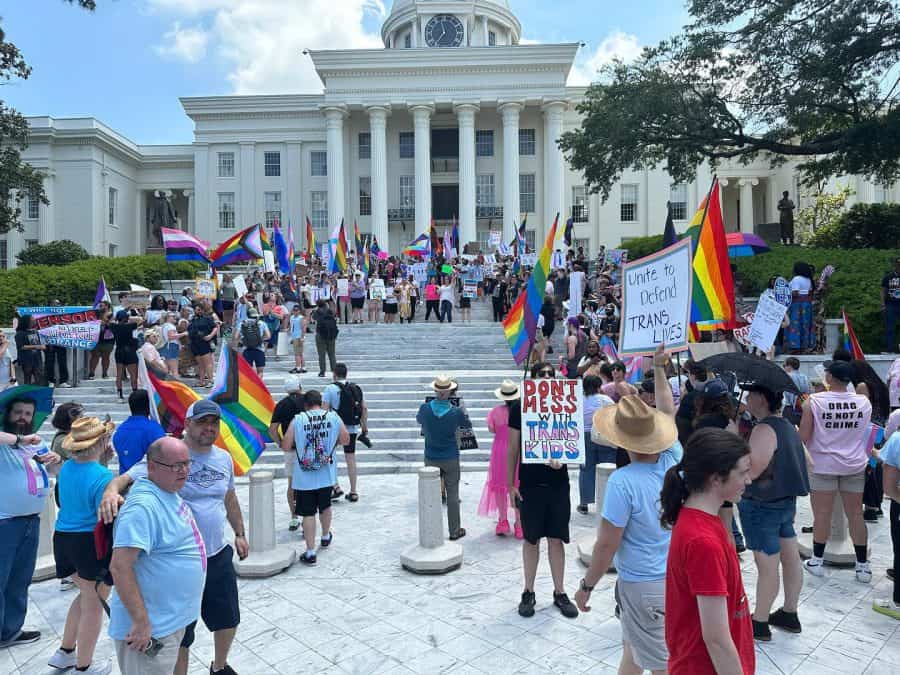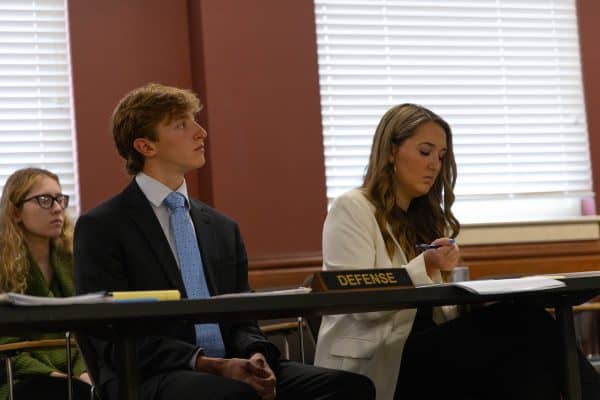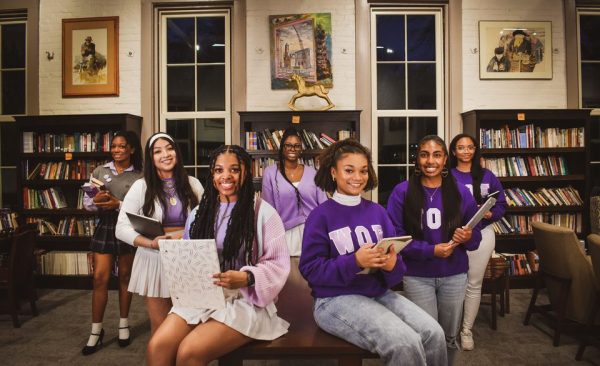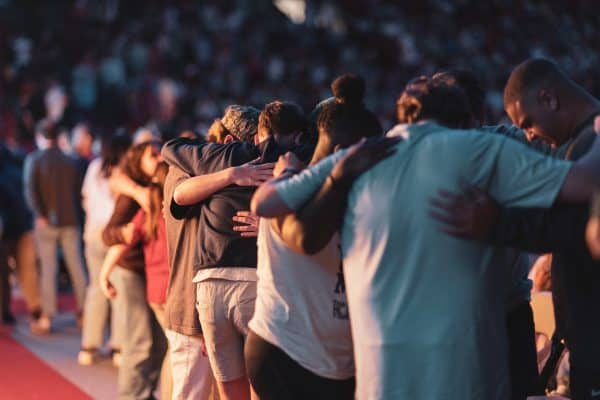Alabama joins wave of states attempting to ban drag performances
Protestors stand outside of the Alabama Capitol in Montgomery for a “Drag Me to the Capitol” march on May 16.
June 7, 2023
Full-glam makeup, a big blond wig and a beautiful white ball gown. Lotus, a local Birmingham drag queen, takes to the stage every Saturday night to put on a dazzling show for her fans.
It’s a celebration filled with laughter, dancing and acceptance and is a much-anticipated night of the week at Al’s on Seventh, a gay bar in Birmingham.
However, in April, new legislation was introduced in Alabama attempting to prohibit drag performances in public places.
The new anti-drag effort in Alabama is an amendment to the state’s Anti-Obscenity Enforcement Act, known as HB 401, which was originally introduced in the 21st century. This measure prohibits the distribution of obscene material to minors. As a consequence, it will prevent any public drag performances, including drag story hours in K-12 public schools, public libraries and in other settings where minors are in attendance.
According to HB 401, anyone deemed to be wearing “sexually revealing, exaggerated, or provocative clothing or costumes,” including drag queens, could be banned from public places where children may be present.
Drag is defined by PBS as “the art of dressing and acting exaggeratedly as another gender, usually for entertainment such as comedy, singing, dancing, lip-syncing or all of the above.”
Although drag queens may use female pronouns and a stage name during their performance, they may identify as another gender outside of their drag persona. They This should not be conflated with transgender individuals, whose use of alternate names or pronouns is not performative.
However, due to these laws’ broad language, many are afraid that they not only target drag queens, but trans individuals.
“I am very concerned about all the ways that current criminal laws and new acts will be disparately enforced against trans people and drag performers,” ACLU lawyer Chase Strangio said in a Them article.
Alabama’s legislation comes as part of a number of anti-drag bans sweeping the United States. The first of these was signed in Tennessee by Gov. Bill Lee back in March. A federal judge blocked it over concerns that it violated First Amendment rights.
“It leaves it open to discriminate not only against the drag community, but also the trans community,” Lotus said. “It leaves it open for this vitriol-like disdain for what I do.”
Lotus, a realtor at her 9 to 5, has been performing in drag since she first encountered it during her studies at Auburn University.
Alabama’s new legislation specifically targets “topless, go-go, or exotic dancers, or male or female impersonators, commonly known as drag queens or drag kings.” One of Lotus’ main frustrations with the bill is the argument that drag queens display predatory and oversexualized behavior, which is a common argument for keeping them away from young people.
“Drag is a lot to do with stage presence and pageantry,” Lotus said. “There are some shows I would not bring my niece or nephew to, but there are many shows specifically geared towards children that are considered appropriate. Parents should have a right to choose what’s best for their kids.”
Lou Campomenosi is a member of the Common Sense Tea Party Campaign, a political group in Alabama that campaigns against the LGBTQ+ community.
He said the behavior of drag queens, among others, goes against the natural flow of biology and should not be encouraged in legal affairs. He is also opposed to child-friendly drag interactions, including Drag Story Hour reading sessions.
“It seems that we are on firm constitutional grounds to protect these children from what we see as sexual predators and sexualization at this early age,” Campomenosi said.
Furthermore, advocates for the LGBTQ+ community are asking critics to face the reality that these bills actually hurt children. A 2021 survey by the Trevor Project found that nearly half of the LGBTQ+ community seriously considered suicide in the past year. Rates were notably high among individuals of color.
“You have so many youth contemplating suicide and hurting themselves because they feel like they have to punish themselves for how they feel on the inside,” Lotus said.
This is not the only recent law to face criticism from LGBTQ+ advocates. Alabama lawmakers voted last April to outlaw gender-affirming medications for transgender children. That law has been temporarily blocked due to legal challenges.
Conservative views in politics aren’t the only thing pushing these restrictions forward. Organized religion appears to be playing a considerable role in this debate, with concerns that drag cannot coexist with Christianity.
“Drag queens represent something that we think really crosses the line in terms of the Christian tradition,” Campomenosi said. “There are lines against where pornography can go and I think that to a certain degree, these things become pornographic.”
Drag shows don’t typically involve nudity or stripping — supporters draw a line between drag and burlesque performances. Despite this distinction, the tension between religion and the belief that drag is concerned with “sexualization” has caused significant issues for members of the LGBTQ+ community, especially those who are religious themselves.
Lotus spoke on her religion, and how being a drag queen has impacted her stance on Christianity. Campomenosi’s concern that drag does not align with the “Christian” perspective is not unusual. Despite this, Lotus does not believe that the two had to be at odds.
“They always said in church that people who lived this way were fallen from God,” Lotus said. “And the thing is, I don’t think that even as a 32-year-old man now I feel like I’ve fallen from God. I just feel like the church fell away from me.”
Sydney Duncan, a lawyer at Magic City Legal Center, was concerned by the new legislation, and its impact on the community. Duncan works at Birmingham AIDS Outreach and specializes in LGBTQ+ legal matters.
“I wish that those who are in support of these laws would stop and slow down,” Duncan said. “The legislators who have offered these bills to begin with have often never been to a drag performance. They’ve never met a trans person. They don’t have the context to legislate these things.”
Campomenosi said he had not visited a drag show but had seen materials online that had informed his position on the matter.
Although Alabama is one of many states attempting to pass such legislation, there have been numerous factors that have at least temporarily kept the bills in other states from going into effect. Whether Alabama’s new legislation will face similar challenges is currently unclear. What is clear is that parties from both sides will be anxiously awaiting legal developments.
On June 6 those developments came when the 2023 regular session of the Alabama Legislature concluded and HB 401 was killed.











